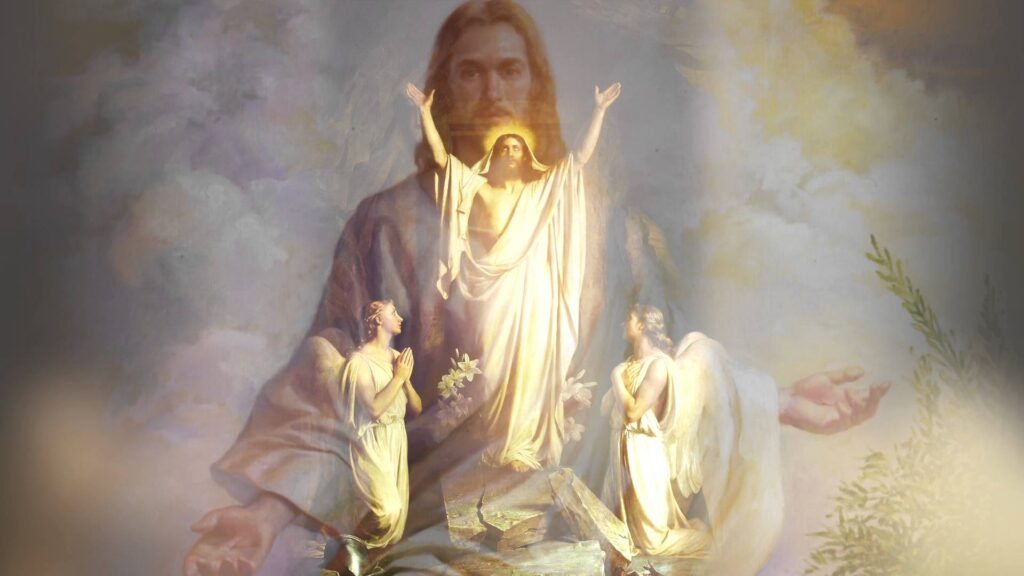
The use and misuse of power.
When we see a phrase like this, we think of powerful persons, institutions or some kind of disaster, don’t we? The use and misuse of power connotes vastness.
Someone Huge!
Something colossal!
We sure don’t think of ourselves—our reason, will or our intellect as method for the use and misuse of power, at least I didn’t. Until I read last Tuesday’s Office of Readings: St. Basil the Great’s excerpt from the Detailed Rules for Monks. The excerpt is maybe 500 words. But just about each word seemed to leap off the page and appear in a font of 64, as in SHOUT! Starting with “The ability to love is within us.”
But primarily this sentence: This is the definition of sin: the misuse of powers given us by God for doing good, a use contrary to God’s commandements.
Contained in these few hundred words is all the wisdom needed to be perfect as Our Father in heaven is perfect. St. Basil’s counsel is simply stated: we need not travel, learn from wiser counsel, or be someone special because,
- Love of God can’t be taught.
- We have what we need.
- We learn from ourself and within ourselves.
Shortly afer I became Catholic, I cancelled a trip I’d planned to the Greek Islands more than two years before. My husband John was surprised when I did it because the company would refund only half of the money I’d already paid. I didn’t care, I no longer needed to go to the other side of the world.
All those years that were wrought with the use and misuse of power were extinguished by the “power of reason implanted like a seed.” God’s mercy permits even hardened sinners to return and make use of that power of reason.
We have everything we need
St. Basil writes: “First, let me say that we have already received from God the ability to fulfill all his commands. We have then no reason to resent them, as if something beyond our capacity were being asked of us. We have no reason either to be angry, as if we had to pay back more than we had received. When we use this ability in a right and fitting way, we lead a life of virtue and holiness. But if we misuse it, we fall into sin.
This is the definition of sin: the misuse of powers given us by God for doing good, a use contrary to God’s commands. On the other hand, the virtue that God asks of us is the use of the same powers based on a good conscience in accordance with God’s command.
Since this is so, we can say the same about love. Since we received a command to love God, we possess from the first moment of our existence an innate power and ability to love. The proof of this is not to be sought outside ourselves, but each one can learn this from himself and in himself.
I’ve read St. Basil’s words countless times now and think as I do so, it’s like everything in the spirtitual life: easy and excruciating.
All too often, we allow ourselves to believe our prayers are ineffective, that it’s actions that matter. We behave just like King Ahaz: I will not ask!!
Uppn learning about the Mystical Body of Christ, so many years ago now, my first thoughts were, “Of course! Of course we’re connected with one another, therefore my sin—or grace—affects everyone else…”
But we forget.
I’m reminded of a story
told by a newly ordained priest I heard last year at a daily Mass at St. Patrick’s Church in Arroyo Grande, California.
Father David Allen called his homily for that November daily Mass, “Holiness can’t be taught.” The young priest couldn’t recall where he’d read the phrase but in his talk, he added to the phrase, “It must be caught.” But I wonder if it was St. Basil he paraphrased.
The ability to love is within each of us
Love of God is not something that can be taught. We did not learn from someone else how to rejoice in light or want to live, or to love our parents or guardians. It is the same—perhaps even more so—with our love for God:
Fr. David’s story was about his friend, an upperclassman, two years ahead of him, who had just returned from his pastoral year with a local priest.
“How was it?” Fr. David Allen asked his friend.
“Interesting, I enjoyed it.”
“Did anything happen that surprised you?”
“Yes, the parishioners at the church kept asking me how I’d gotten to be so holy, so content with silence.
“What did I do?
“How did I pray?
“What prayers did I say?
“And there wasn’t anything I could say that I did.
“In fact, I do nothing! Nothing at all…
“I just love Jesus…the more I love Him the more I want to love Him- it’s like an addictiion!”
Fr. David looked at us and said, “Holiness can’t be taught, it must be caught.”
“We know about addiction, it’s all about getting the drug.
“Now! It’s all about the drug. How about our drug being Jesus?
“How about us getting addicted to Christ?”

For through him we both have access to the Father by one Spirit.
Consequently, you are no longer foreigners and strangers, but fellow citizens with God’s people and also members of his household, built on the foundation of the apostles and prophets, with Christ Jesus himself as the chief cornerstone.




The solution to all the problems in the world is simple. Turning our attention to Jesus. Becoming addicted ?❤️
Thank you Lin
Amen, my friend, Amen!!
Love this way of thinking! Especially “love must be caught”!